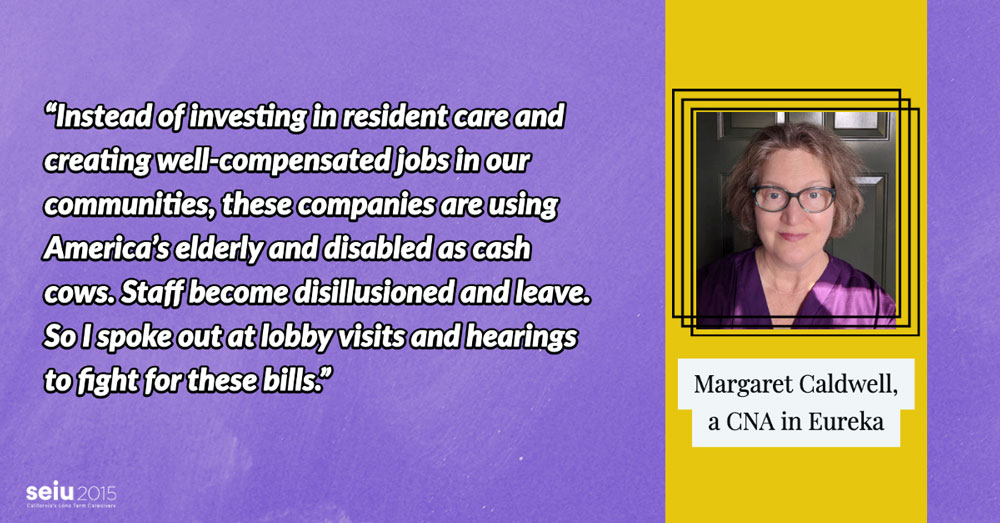Governor Newsom just signed our nursing home bills—creating two laws that will help prevent nursing home operators’ practice of using our facilities simply as ATM machines, while patients and staff suffer from a lack of a meaningful investment.
Our members have been making their voices heard across the state—through lobby visits and testimonies in Sacramento, rallies and strikes in the streets, and through their own CAF contributions.
Our members’ work made sure that elected leaders understand why we must stop ultra-wealthy nursing home owners’ get-rich schemes. This legislation will fight nursing home executives who use accounting tricks that shovel profits back to themselves while neglecting resident care and worker safety.
The problem:
COVID-19 drew attention to the condition of California’s nursing homes, but these problems didn’t just surface in the pandemic. Those working in these facilities have been blowing the whistle on deficiencies for a long time, including more than 20,000 nursing home workers of SEIU Local 2015.
As far back as 2015, the Sacramento Bee unmasked the intricate corporate structure behind Brius Healthcare—California’s largest nursing home chain. The Bee’s reporting revealed how the legal layer cake allows corporate owners to shield themselves from responsibility for dangerous nursing home conditions.
Then, as the pandemic reached its peak last December, the Washington Post reported that Brius paid SEVENTY related companies for everything from rent to supplies. Some of these were owned by executives’ family members—and the whole scheme has one goal: to funnel as many taxpayer dollars as possible into owners’ pockets and away from resident care.
The solution:
Our own SEIU Local 2015 union, in partnership with SEIU California, investigated the issues and learned that these corporate shell games are widespread and growing. Related party transactions now account for more than $1 billion dollars siphoned from nursing homes and into sister corporations.
So our SEIU Local 2015 union found key long-term care advocates in Sacramento to introduce legislation to address this.
SB 650 (Stern)
Senate Bill 650 requires nursing homes to file annual consolidated financial statements, giving the State and the public more information on nursing homes, many of which are privately owned by large for-profit chains that utilize increasingly elaborate corporate structures to hide their finances and shield themselves from oversight. This shines a light on how nursing homeowners hide behind financial and legal corporate shell games to enrich themselves, while their facilities are understaffed, lack supplies, and pay poverty wages—all at the expense of taxpayers, the elderly, and people with disabilities.
The law goes into effect on January 1, 2024 (this will capture financial reports starting with the year 2023).
AB 1042 (Jones-Sawyer)
Assembly Bill 1042 is an essential piece of legislation that closes existing loopholes that nursing facility owners exploit to use “third-party payments” to shell companies in order to evade accountability for abuse and substandard care. AB 1042 will hold nursing homeowners and operators accountable by allowing the state to pursue penalty payments from all of the parties who profit from nursing home care, regardless of the corporate shell games nursing home operators play. This bill is one important step toward transforming nursing homes from profit centers to care centers.
This law goes into effect on January 1, 2023.
Here’s what our members had to say!

These bills are an important first step to getting the money where it’s supposed to be: on safe staffing, good jobs, and safe patient care. In my facility, we often have only two CNAs on the floor for as many as 52 patients. How can two people feed 52 elderly patients—not to mention shower, clothe, walk with, assist with toileting, answer call lights, assist with emergencies, and more. It’s impossible. We’re supposed to have two or three times that many CNAs on the floor. And clearly the owners have the money.
Jesus Figueroa,
a CNA in the Sacramento Area
Next steps for Union members:
- Once these laws do their job of uncovering the double-dealing, we’ll be able to publicly call out the injustice and profiteering—at the expense of our patients. We’ll use the information at the bargaining table, in our outreach to reporters, public actions, and all of our work to bring quality and safety to nursing home jobs and patients.
- Take our SEIU 2015 Caregiver Powered Politics survey to tell us what you’d like to see us work on in Sacramento next year. Click here to take the survey!
- This victory was made possible due to the contributions of our members to our Caregiver Action Fund. You have the ability to make or increase your Caregivers Action Fund contribution today by clicking here. The Caregivers Action Fund (SEIU COPE) program is vital to keeping the In Home Supportive Services program alive. The government directly funds our program, so we need political power to advocate for ourselves and our clients and to keep winning strong contracts.